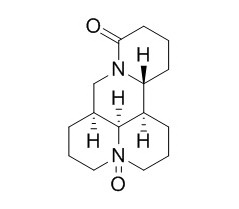Description
Oxymatrine, an alkaloid from Sophora flavescens Alt. with anti-inflammatory, antifibrosis, and antitumor effects, inhibits the iNOS expression and TGF-β/Smad pathway. Oxymatrine inhibits bocavirus minute virus of canines (MVC) replication, reduces viral gene expression and decreases apoptosis induced by viral infection.
Solubility
H2O : 100 mg/mL(378.27 mM;Need ultrasonic) DMSO : 100 mg/mL(378.27 mM;Need ultrasonic)
Source
Plants >Leguminosae > Sophora flavescens
Shipping
Room temperature in continental US; may vary elsewhere.
SMILES
O=C1CCC[C@]2([H])[C@@]3([H])CCC[N@@+]4([O-])[C@@]3([H])[C@](CCC4)([H])CN21
In Vivo
The volume and weight of tumors in mice significantly decreased in a dose-dependent manner. Oxymatrine may reduce prostate cancer cell growth by promoting cell apoptosis in vivo. Oxymatrine is effective in reducing the production and deposition of collagen in the liver tissue of experimental rats. Oxymatrine could promote the expression of Smad 7 and inhibit the expression of Smad 3 and CBP in CCl4-induced hepatic fibrosis in SD rats, could modulate the fibrogenic signal transduction of TGFβ-Smad pathway.
In Vitro
Oxymatrine, an alkaloid component extracted from the roots of Sophora species, has been shown to have antiinflammatory, antifibrosis, and antitumor effects and the ability to protect against myocardial damage, etc. The potential signaling pathways involved in the clinical application of oxymatrine might include the TGF-β/Smad, tolllike receptor 4/nuclear factor kappa-light-chain-enhancer of activated B cells, toll-like receptor9/TRAF6, Janus kinase/signal transduction and activator of transcription, phosphatidylinositol-3 kinase/Akt, delta-opioid receptorarrestinl-Bcl-2, CD40, epidermal growth factor receptor, nuclear factor erythroid-2-related factor 2/hemeoxygenase-1 signaling pathways, and dimethylarginine dimethylaminohydrolase/asymmetric dimethylarginine metabolism pathway. Oxymatrine significantly inhibits the proliferation of DU145 and PC-3 cell lines in a time- and dose-dependent manner. By contrast, following treatment with oxymatrine, PNT1B healthy human prostate cell proliferation is not inhibited.
